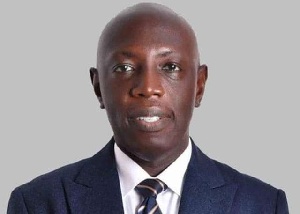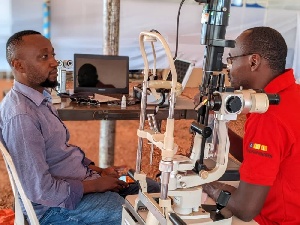- Home - News
- Elections 2024
- News Archive
- Crime & Punishment
- Politics
- Regional
- Editorial
- Health
- Ghanaians Abroad
- Tabloid
- Africa
- Religion
- Photo Archives
- Press Release
General News of Thursday, 29 May 2025
Source: www.ghanawebbers.com
Fidelity Bank committed to climate resilience as a core business imperative – Atta Gyan
Fidelity Bank Ghana is committed to climate adaptation in its lending strategy. The bank aims to mobilize private capital for a climate-resilient future.
Atta Yeboah Gyan, Deputy Managing Director, shared this approach at a forum. The event took place at the Alisa Hotel in Ghana. The theme was “Unlocking growth through climate resilience and private sector leadership.”
Mr. Gyan emphasized that climate adaptation is a strategic imperative. He sees it as both a risk management issue and a value creation opportunity. He explained that the bank identified climate risk as an important ESG topic.
This commitment is backed by a strong Environmental and Social Management System (ESMS). It aligns with IFC Performance Standards and the Bank of Ghana’s Sustainable Banking Principles. Mr. Gyan noted that they recently conducted their first portfolio-level climate scenario analysis.
This analysis covered Retail and Corporate & Investment Banking segments. It included potential climate-related disruptions to branches and ATMs. The findings helped create detailed climate risk heatmaps for better understanding.
The bank's three-year Climate Implementation Plan supports Ghana’s Nationally Determined Contributions (NDCs). This ensures financing aligns with national climate adaptation priorities. Fidelity Bank integrates climate risk screening into credit assessments, focusing on vulnerable sectors like agriculture.
Mr. Gyan provided examples of their efforts in agriculture. They are piloting tools to assess drought and flood vulnerability for clients. Training frontline staff to recognize adaptation indicators is also crucial.
Beyond internal management, Fidelity Bank seeks to unlock private finance for resilience in Ghana. They launched an Electric Vehicle (EV) Financing product to promote green transport. Asset finance products help schools and hospitals integrate solar energy.
Through their Bridge-in-Agriculture initiative, they supported over 12,000 new jobs. More than 20,000 smallholder farmers benefited, with over 60% being women. This shows that adaptation can be inclusive and financially viable.
Mr. Gyan believes blended finance is essential for success. Collaborating with development partners can help de-risk investments in vulnerable areas.
Looking ahead, Fidelity Bank made recommendations for the Global Centre on Adaptation (GCA). They urged support for technical capacity-building in commercial banks regarding climate risk tools.
They also called for de-risking instruments to increase appetite for adaptation finance. Co-developing bankable adaptation projects in agriculture was another suggestion.
Promoting standardized climate risk data will improve decision-making across banking sectors too. Mr. Gyan concluded by stating that adaptation is essential for resilience and profitability when paired with proper partnerships.
Fidelity Bank aims to lead these efforts in Ghana while collaborating with various stakeholders.
Entertainment










